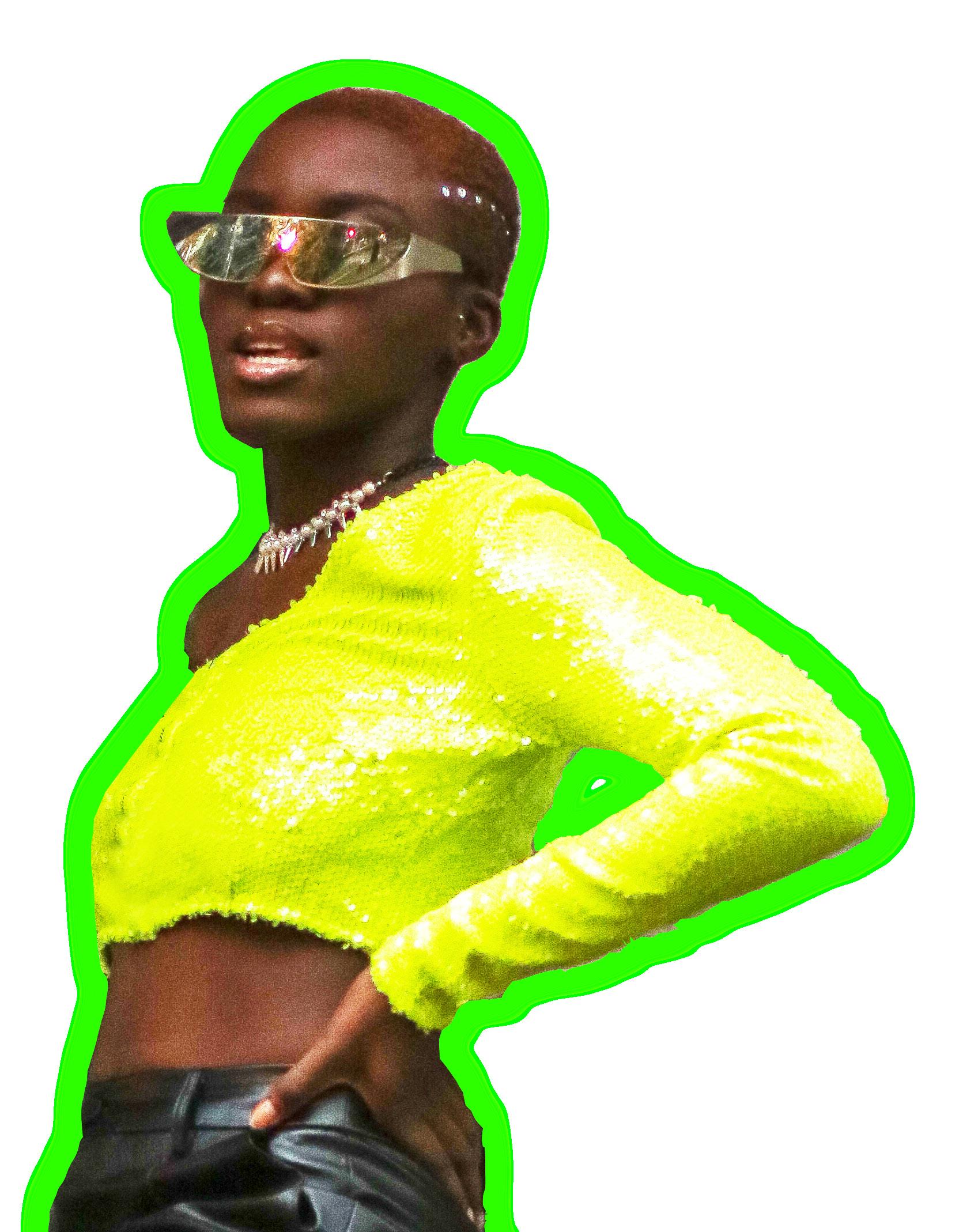
15 minute read
Ruth Bader Ginsburg
gloves don’t make a lady nor does a pantsuit make a ceo. it’s clear ruth bader ginsburg understood that the traditional black robe she stepped into in 1993 represented a doctored image of male authority; one that loitered behind her ferragamo heels for most of her life, but could never quite catch up to her. so, as she has done many times before, she claimed the image she was expected to accept and rewrote her narrative. the intrinsic values created by rbg’s style are unequivocally linked to her fight for equality; a piece of herstory that is often overlooked. rbg never used style as a superficial spectacle, but rather as a tool to project her own voice as well as that of the voiceless. fellow justice sandra day o’connor recommended rbg wear gloves at public events to mask the shakiness of her hands, a result of chemotherapy. and that’s when a glorious love story began, between rbg and a pair of fishnet gloves. like many of her fashion choices, these iconic gloves were worn for style as well as significance. one pair of her net gloves were worn as an ode to inist agenda in the 1980s. a white reference to the popular art deco in the early 1920s-- the decade R traditionally “ladylike” black fishmadonna’s fembeaded pair was a style developed the 19th amendUTH ment extended women the right to vote. rbg’s iconic collar started as an attempt to add a feminine her collar was decorated with a which made many appearances in this quickly evolved into illustristatement necklaces. many of them B touch to a masculine robe. initially, white lace jabot, the courtroom. ous collars and were received as ader gifts from foreign leaders, young artists, and supporters from all walks of life. her choice to adorn her robe with these diverse
Gpieces perfectly aligned with her life’s work of creating spaces for all people to be treated equally. and let’s not forget the “dissent collars” that insburg sent the media, and nation, into a frenzy. she wore the dissent collar in the courtroom as a strong message to the public of her dissenting opinions. even though the court wasn’t making decisions that day, ginsburg wore her notorious embellished black dissent collar on the bench the day after trump’s presidential victory, as a bold opposition to the election results. her poignant use of lace, white, and sparkles (gendered symbols) was so much more than a display of decadent personal style-- it was an act of resistance to the pressures to conform to a starkly male environment as well as a rejection of the many labels placed upon women. ginsburg reminds us all that femininity does not make a woman weak. and it certainly does not strip her of her power. thank you ruth bader ginsburg for your tireless efforts to ensure that women can be in the room where decisions are Article by MAyA Shetty being made. rest lAyout by DeirDre Merritt in power. MoDeling by JAcqueline riSch Styling by MonicA SAntiAgo PhotogrAPhy by MAyA DoMinguez
Advertisement



Q: When you see injustice, how does it make you feel?

A: The first feeling and probably the one that sticks the most is frustration. It’s been a real long time that discrimination and stuff has been going on. The other day I was on Ancestry.com and I was able to see my grandmother’s grand- father. It showed the slave dwelling that he lived in and all this different stuff and I was like man this is a whole five generations ago that slavery ended and we still have so many steps to take. And it feels like there is always going to be steps.

Class: Senior Pronouns: He/His Major/Minor: Marketing Major Clubs: President of ASILI, MentorGSB Diversity, Equity, & Inclusion Marketing Director for the FBDC, ham Business Development Collaboratory ing leads for the Program, Ford-


Q: Why is it important to look out for Black women/LGBTQIA+ people?

A: We [Black men] benefit from installed patriarchy or heteronormative society. A lot of people have to deal with discrimination when it comes to their gender, their sexual orientation... they have to deal with discrimination when it comes to their race as well, so I believe it’s important to protect those communities because they are the most vulnerable out of all of us. MLK said something along these lines: “There’s no justice ‘til everyone gets justice, nobody’s free till everyone’s free.” If you want to work for some sort of equality or level the playing field for yourself, it’s hypocritical to not want to do that for everybody within every community.
Q: What are your goals as President of ASILI?
There’s been a real exclusionary culture at Fordham, especially for Black students, considering we’re like the smallest population, 4% of the whole university. It’s a very isolating experience for a lot of the Black students....A lot of people commend us for being a club that was active over the summer. At a junction like that in this nation’s history, I don’t think it would be appropriate for people, especially for people in higher education, not to participate.
Q: What are your goals as the current president of CASA?

A: I know that the African-Caribbean community is fairly small at Fordham so my main goal is to just create a community for them, a safe space for Caribbean-African students to go to when they don’t feel in place in any other places. Also, to just get them to celebrate their culture with food, clothes, whatever it is that they want to do. I want the club to be as much for them as it is for me because I created it to give myself a place at Fordham. So I want anyone that wants to be a part of the club to make it whatever they want it to be.

Class: Senior
Pronouns: She/Her
Major/Minor: Economics and International Political Economy double major
Clubs: Co-founder/President of the Caribbean and African Student Association, Cultural Programming Coordinator for LGBTQ+
History Month and the Office of Multicultural Affairs


Q: How is CASA different and/or similar to ASILI/El Grito?
A: I did create CASA because when I came here, I had an extremely different identity because I am an international student, so it was a lot of learning what it meant to be Black in America because I come from a predominantly Black country. If you are an immigrant here or your parents are immigrants, then you feel like you start to lose that cultural identity, so those are the types of things that CASA provides for people.

Q: How has society influenced the way you perceive yourself?
A: At home, in Nigeria, there are a lot of-- it is very strict-- like, you know, you are either a man or a woman, male or female, like you would die or go to jail for fourteen years if you’re apart of the LGBTQ+ community. Being here [in America] definitely gave me a chance to just be free and just be more of myself. I also think being here allowed me to learn what it is to be Black, like I said before. Before, I didn’t talk much about that, but learning about the ways that my Blackness affects me here and even at home because I didn’t think that Blackness mattered at home, in Nigeria, but it really does because of the many white people that do come to that space and take space in Nigeria.

Class: Senior Pronouns: She/Her Major/Minor: Sociology and Spanish double major Clubs: Secretary for ASILI, Co-chair for the Committee on Sexual Misconduct on USG, and Events Chair for Leading Women of Tomorrow

Q: What motivates you to constantly be an activist for women, especially women of color?
A: I think that because I am a Black woman, that is what motivates me, but the real reason as to why I became an activist is because I have been in predominantly white spaces my entire life and so I wanted to put myself in a position where I could advocate for women of color in spaces where they are normally left out of conversations. And not only women of color but marginalized people in general. Yeah, so, this kind of started in high school and then at Fordham I wanted to continue that. That’s what motivates me.
Q: When you see all the injustice acted upon Black people in this country, how does it make you feel?
A: I think it’s a mix of emotions. It’s frustrated, it’s sad, it’s angry mostly. I guess it’s feeling helpless and hopeless a lot of the time because it seems as though no one is actually trying to fix the systems that create this oppression, they’re kind of just doing band-aid effects. So it’s frustrating that in 2015, I remember going to school, wearing a shirt that said, “I Can’t Breathe”, and now it’s 2020 and I’m still doing the same fight. It’s frustrating and it’s sad, I guess, seeing what’s happening. I think that the reason things haven’t changed is because they think they can tire us out (which is a whole nother thing). But I gotta keep advocating.
Q: What are some ways that you’ve experienced racism, especially on this campus?


A: In a lot of ways. In microaggressive ways in class, I’ve had a lot of people say things about cultural appropriation that were offensive and professors not really stepping in to correct them. And having me have to explain to these people why what they are saying is problematic. I’ve had instances off-campus where students have been rude to me. I’ve had instances with administrators comparing an organization to the KKK that were not correct. So yeah, I would say that I’ve had a lot of racist experiences on-campus that have never been resolved or fully addressed.

Q: What do you think makes you different, especially from other people in your community?
A: I think that depends on each community. When I think of the Fordham community, the biggest difference in my entire schooling and education is that I’m in a predominantly white space, and I think that’s something that for the foreign community that singles me out. Not necessarily in a bad way or anything, but I’m like that’s my difference. And then for like LGBT community, I’m lesbian, but I’m also Black. And that’s also another thing where it’s like, where a lot of things that get centered for the LGBT community is white, is cis, is skinny, you know all of these things. And then for the black community it’s because I’m a lesbian. For all these things I couldn’t answer in one single point because it just feels different for me in all those communities. All those things kind of stick out to me and I hold close to me as those are my differences, and I find community with people who match those differences.
Q: What forms of racism, queerphobia, sexism, and/or other forms of discrimination have you experienced throughout your lifetime?

A: There’s so many that I can’t even try to get into every instance. Since, I think, in high school that’s when I first, like-- I’ve always been aware that I’m Black and that a lot of people around me are white-- but in high school it first dawned on me that people see me and think so much negativity, they have such a profile and an idea of me just because of my skin. It hit me hard to realize that I couldn’t change that and no matter who I am, people are going to look at me and think so many negative things, and that was really hard. And there have been so many instances. It was never a thing where people were hateful, but I’ve been made so uncomfortable and singled out so many times, even if you didn’t hate Black people, but it was such an uncomfortable instance. And homophobia, very big with my family and stuff, but that’s another thing that’s been colored throughout my entire life. I couldn’t even get into it. My whole entire life, especially high school, there’s been so many.




Class: Sophomore Pronouns: She/They Major/Minor: Political Science major (Potentially Education) Clubs: PR Manager for Casa and member of Flava



Class: Senior Pronouns: She/Her Major/Minor: Environmental Studies & Spanish Literature double major Clubs: President of El Grito and member of SEAJ, Students for Environmental Awareness and Justice
Q: How can non-people of color help you, and what do you want white people, especially white women, to know about people just like you?
A: I think first, within the Black community, or the mixed race community, know your boundaries. Don’t overstep your boundaries and voice over people. For myself, I have light skin privilege, right? That’s a real thing. I also just have to realize that for me, personally, not to voice over my darker-skinned peers, or other Black women. And really just knowing your place in this world. Especially white women, you need to know your place in this world. Yes, you want to be a feminist, but is your feminism intersectional? Are you fighting for trans rights? Are you fighting for black trans rights? Just really getting out of the frame of very conventional activism and performative activism. People really need to step up their game!
Q: What do you want young Black people to know? Or if you could talk to your younger self, what would you say?


A: Black Lives Matter is not a trend. For some people, it might be a trend, but there are so many people within and outside of our community who are there to support black people. And that Black lives DO matter, that you are worthy of being a person whether you do nothing with your life, or you are the next president or something like that.
As a Black person, you do matter. You are important to this world, and we have to just keep fighting for our rights... We can’t give up on trying to fight for a better world. It can be really hard now, seeing everything, to want to give up, but we can’t give up. Just keep going.


Q: What is the biggest issue we need to focus on today, and you encourage other people to go about that?

A: I think one of the biggest things we can do is be empathetic. If sometheir experience with you as a Black person, make sure you’re just beof that and not questioning it or trying to put yourself in the situation cause there is not really an equivalent. In terms of quality, everyone’s experience is unique and you can still be apart of the movement and cause by supporting and amplifying the voices of those who are apart of marginalized groups.
Q: What is ASILI doing to make Fordham a better place for everyone?

A: I think most recently and over the summer, ASILI has been working on our demands which are not just tailored to make the Black experience at Fordham better but also talking about making things better for LGBTQ+ and getting the Palestinian club status and recongition. ASILI is trying to make it a more safe and comfortable environment for everyone which comes with working with administration to change policies on campus or policies where there are gray areas. We are trying to clarify these issues for students. For example, the protest policy on campus, there have been a lot of questions surrounding that especially with all the things going on in our political environment too. Protests are inevitable in a lot of spaces. So then what does this look like for students in terms of repercussions because we felt that the Fordham administration wasn’t too clear about those rules. We are trying to increase Black representation in CPS because there is only one psychologist that works there who is Black. There is a lack of representation for people who aren’t white men throughout campus, so we are trying to push the school to better in this sense because apologies are appreciated but at some point you need to do better and not just say sorry for things. We are trying to hold the administration accountable. Class: Senior Major/Minor: Urban Studies major Clubs: Vice President of ASILI and Urban Plunge Leader/Cap- tain
how do

one is sharing ing supportive
Pronouns: She/Her be-










